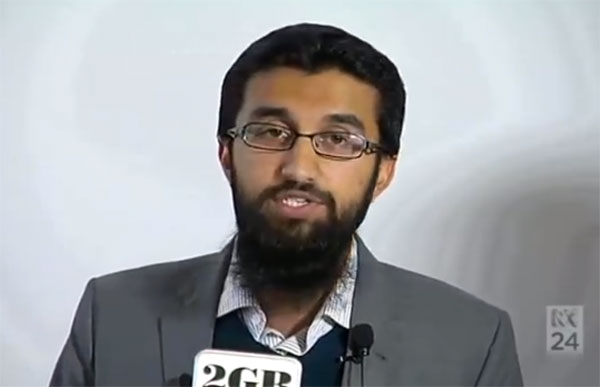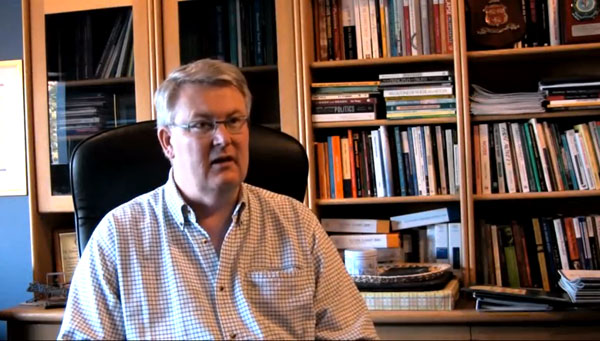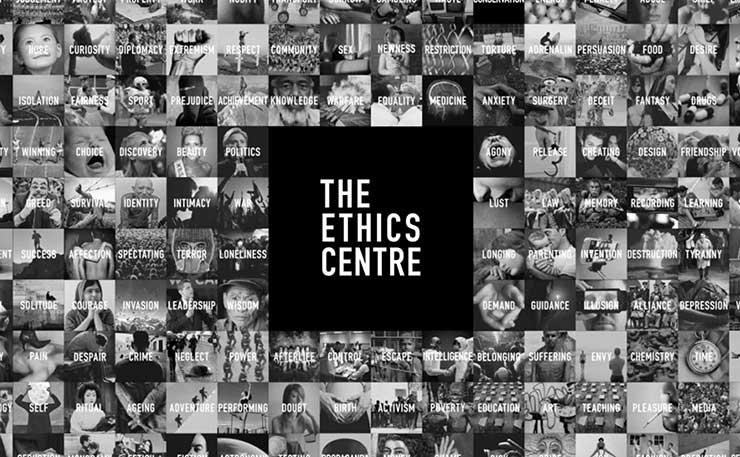It’s been a good year for the St James Ethics Centre.
The Centre, which describes itself as “a unique centre for applied ethics, the only one its kind globally,” is based in Sydney. It specialises in solving thorny dilemmas for the private sector, and is available for hire as a kind of ethical consultancy.
“We pride ourselves on being a catalyst for ethical change by working with passionate individuals and organisations to bring about successful collaborations,” the Centre’s website reads.
The Centre began in 1989, founded by the Anglican parish of St James’ in Sydney’s King Street. It soon broke its links with the church in all but name. Its driving force is its executive director, Simon Longstaff.
Appointed in 1991, Longstaff has been the public face of the organisation ever since. Nowadays he moves in the upper crust of Australia’s business and political elite, rubbing shoulders with captains of industry, senior politicians and well-known figures in the arts and media.
While the business consultancy remains its bread and butter, the Centre is perhaps best-known for its role in bringing ethics to the masses in a series of public events. It is co-presenting the Sydney Opera House’s Festival of Dangerous Ideas this weekend, a two-day event that aims “to bring contentious ideas to the fore and challenge mainstream thought and opinion”.
When New Matilda first visited the St James Ethics Centre in 2013, it was housed in a borrowed back office in a suburban office block in Mosman. When we visited again in early July this year, St James Ethics Centre had moved to Legion House, a cutting-edge, sustainably renovated mixed development in Castlereagh Street.
The St James Ethics Centre’s impressive corporate and political connections have paid off. The Centre occupies its prestigious new offices at no cost, in a deal in which the City of Sydney allowed the developers of the high rise tower behind Legion House to go higher than would otherwise have been permitted, in return for the “public good” of providing the SJEC with subsidised office space.
Big construction firm Grocon was then allowed to add two floors onto the smaller heritage building for its Sydney headquarters in return for turning it into a 6-star sustainable building. Together Grocon and the three other owners of the property fitted out SJEC with suitably impressive furniture and original artworks.

SJEC earns income through donations and consultancies. Clients include the Australian Nuclear and Science and Technology Organisation, the federal government departments of Defence and Foreign Affairs and Trade, BT Financial Group, Macquarie Bank, the Reserve Bank, NSW Police, Origin Energy, and Medicines Australia a peak organisation for major pharmaceutical companies.
As the Centre gets ready to co-present the Festival of Dangerous Ideas with the Sydney Opera House this weekend, it is these same corporate links that are leading some to raise questions about just how ethical the St James Ethics Centre really is. In particular, questions are being raised about the make-up of theSt James Ethics Centre’s board.
This is not surprising: 2014 has seen an unprecedented level of scrutiny of corporate connections to cultural events. In February, controversy over the political implications of the Sydney Biennale’s board and sponsors suddenly exploded, after a group of artists called for a boycott over the Biennale’s links to offshore detention centre operator, Transfield Services.
The Biennale boycott ignited a storm of controversy over the role of the Belgiorno-Nettis family in profiting from the inhumane detention of asylum seekers. It drew in federal ministers George Brandis and Malcolm Turnbull, and eventually forced Biennale chair Luca Belgiorno-Nettis to resign.
Now a number of artists have turned their focus to the St James Ethics Centre, over its links to Operation Sovereign Borders and the Australian military. Indeed the most dangerous idea to trial at the Festival of Dangerous Ideas might be an impromptu speech about the ethics of its partners inside the forum of the Festival itself during a lunch break.
A group of female artists, calling themselves Too Many Girls in the Pit, have called for a boycott of the Festival of Dangerous Ideas. They point to the fact that SJEC board member Jim Molan, and recently resigned Board member Douglas Sneddon, are both connected to the Abbott government’s harsh asylum seeker policies.
In an open letter addressed to Pussy Riot members Masha Alyokhina and Nadya Tolokonnikova, the group argues that “the St James Ethics Centre runs on manufactured controversy in organising cultural events and profits off this controversy but neutralises the importance of having board directors who profit from the human rights abuses of refugees”.
Questions about the St James Ethics Centre Board were first raised at the end of March, in the context of the Biennale boycott. At that stage Sneddon, a board member of immigration detention provider Transfield Services, was the treasurer of the St James Ethics Centre’s board, on the Board of its Foundation and individual contributor of more than $5,000 a year. Sneddon has since resigned from these positions.
Sneddon is not the only controversial board member. There are other connections between the SJEC and Australia’s brutal and increasingly militarised asylum seeker policies.
Major General Jim Molan, another St James Ethics Centre board member, is a focus of dissent. Even before the Coalition won power, Molan had been actively involved with the Liberal Party in developing its Operation Sovereign Borders immigration policy. After the election, Molan was appointed as Tony Abbott’s Special Envoy on Operation Sovereign Borders, a paid position.
Molan is a former general who served in Iraq. While on secondment from the Australian Defence Force, Molan led US and Coalition forces during the insurgency there, at one stage becoming the third-highest ranking Coalition officer in the country.
Molan was intimately involved in planning and command of the notorious November 2004 assault on Falluja, in which hundreds and perhaps thousands of civilians died at the hands of US airstrikes and artillery barrages. As well as attacks on vital infrastructure such as hospitals and water supplies, US-led forces attacked insurgents with chemical weapons, including the well-documented use of white phosphorus.
Another controversial member of the St James Ethics Centre’s board is Christine McLouglin. McLoughlin is a director of mining company Whitehaven Coal. Whitehaven, a star of recent ICAC hearings, is responsible for the controversial Maules Creek coal mine in the Leard State Forest. Environmentalists and local community groups claim the huge open cut mine will destroy vast tracts of the largest area of remnant vegetation in the Liverpool Plains, and damage aquifers.
Several groups, including the local Gomeroi people – who have opposed to the mine on the grounds that it will damage their cultural heritage and have returned donations from the company – the NTEU and Greenpeace are all calling for disinvestment from the mine.
Sneddon, McLoughlin and Molan are all listed in the SJEC 2012/2013 Annual Report as individually donating more than $5,000 to the Centre.
And this is not the first time that this year’s Festival of Dangerous Ideas has run into controversy. A festival presentation suggesting that honor killings are morally justified was removed from the program after a public outcry and threatened boycott.

New Matilda wanted to find out how an ethics centre that prides itself on a vision to create “ a better world where people have the capacity to do the right thing” can justify such connections.
We interviewed executive director Simon Longstaff in early July.
We began by asking Longstaff how the Centre’s board is selected. Longstaff explained that when casual Board vacancies come up, the current board can nominate new members who must be ratified by the next annual general meeting, which is usually attended by between 20 and 50 of several hundred members.
Longstaff says the role of the board, which meets every couple of months, is broadly to ensure that the organisation operates according to its own ethical framework. They are there to provide strategic advice about how the SJEC can meet its goals, make sure the Centre’s finances are in order, and be “ambassadors who would promote the objectives of the organisation even though they might not support the positions taken on certain matters”.
According to Longstaff, the Centre’s board members come from “very different backgrounds,” although he acknowledges that current directors are nearly all from the corporate world. More than once he argued that the appointment of corporate environmentalist Geoffrey Cousins, who he said some right-wing critics of SJEC would see as “socialist scum”, acts as a balance to those who see the Centre as too right wing. He explained the absence of any human rights lawyers or ethical philosophers by saying that he draws on a wide range of advice.
Asked whether a proposed appointment to the Board has ever been considered controversial, Longstaff replies “not that I can think of, because I don’t think our members would ever look at a member of the board in one dimension as to who they are.”
As the chief executive, Longstaff is responsible for editorial matters. He is also independent of the board, which does not take formal positions on ethical debates. There are only two exceptions.
The board decided a long time ago not to accept donations from tobacco or gambling interests. However, Longstaff said he was uncertain about whether the ban on directors associated with the gambling industry is appropriate, given that gambling does not always cause harm.
What do directors gain from their membership on the Centre’s board? When asked what the board brings to Molan, Longstaff hastens to tell us that the benefit flows the other way. Molan’s presence enhances the Board, he says.
For a start, Longstaff points to Molan’s “own personal attributes.” The SJEC has a special interest in leadership, including in the military. “It’s very valuable to have a person who understands that world,” he says. The SJEC engages in “hands-on work,” which has included the preparation of soldiers to go to Afghanistan.
It was in this context that Longstaff met Molan, when he was commander of an ADF staff college. Longstaff adds that Molan “understands the value that such an organisation can bring to bear on debates and ideas” including the “non-sexy stuff” of counselling people where an “ethical wildfire might have gone through an organisation and they have been metaphorically burned and they need someone where it is safe to talk to them.”
Longstaff says that Molan supports the Ethics Centre, even though “from time to time he must look at the things we write or say and roll his eyes.”
Asked about Molan’s position as a special advisor to the government on Operation Sovereign Borders, Longstaff says he believes Molan’s role is more diplomatic than operational. Molan is a “man who has served all his life” and that Australia’s Prime Minister Tony Abbott had asked him to undertake the role. “Here is a PM that he has committed to serve,” Longstaff explains.
Was Molan’s role in the war in Iraq relevant to his suitability for a role on the board of an Ethics Centre? After all, wasn’t the justification for the war – weapons of mass destruction – false?
Longstaff replies that Molan was not involved in selling the lie of weapons of mass destruction. “[He] was certainly not involved in propagating a lie. He was a serving military officer who accedes to civilian power except in matters where they are given unlawful orders,” Longstaff claims.
Longstaff himself has doubts about whether the second Iraq War was a just war. He openly admits to questioning whether “the quality of peace” in Iraq since 2003 has been “better than it would have been if no war had been fought.” But because of his own experience with “people in the profession of arms”, he knows that when it comes to soldiers, “they are always going to look at what is lawful.”
“It’s drilled into them that a civilian power will give them instructions, and they will undertake them to best of their ability,” Longstaff argues. “That is the context in which someone like Jim Molan has to be understood.”
Asked whether he had discussed with Molan the accusations that the assault on Falluja was a war crime, Longstaff explains that the two have “only ever talked about that tangentially”.
“We’ve never actually sat down with him and certainly never in a board meeting because as I’ve mentioned we don’t have those sort of discussions there,” Longstaff says.
“I’ve never really sort of drilled down into what he actually thinks about it and why he thinks it. I’m sure that he would recognise in everything that he has done the extraordinary ethical challenge that arises with different situations, and he would live with the decisions that he made in the context in which he made them,” Longstaff continues.

Molan has written a book about the war. Longstaff hasn’t read it. “It sounds terrible, that I have shown such a lack of interest, that’s not the nature of the relationship or what we spend our time talking about.”
While Longstaff and Molan might not discuss the assault on Falluja, they have a mutual interest in corporate leadership consultancies. For example, in November, the SJEC is a partner in providing a “strategic leadership course” led by General George W. Casey, a US general who led Coalition forces in Iraq.
Appearing along with Longstaff and others will be Molan and Daniel Grollo, Executive Chairman of SJEC’s corporate benefactor Grocon.
In 2013, SJEC hosted a debate about asylum seekers. Longstaff himself wrote a piece providing a framework to assist people to think through the issues. Asked whether the strong opposition of human rights lawyers, psychiatrists and religous leaders to both Labor and Liberal asylum seeker policies, New Matilda wanted to know how comfortable Longstaff felt with Doug Sneddon’s long-term membership of the SJEC Board, given his role as a director of Transfield Services – a company that helped run the detention centres on Manus and Nauru. Was this something the Ethics Centre considered?
Longstaff begins by questioning the wisdom of evaluating individuals according to their associations. “I wonder whether or not you need to look at people in and of themselves rather than by association with particular entities although that does tell you something about a person and the choices they make. The point is trying to sum up a person and their character by just one dimension of what they do is really problematic”.
Asked about the exchange of credibility that an appointment to the St James Ethics Centre might represent, Longstaff replied, “I’m trying to draw a balance here between what signal it sends versus the substance. I’ve always been cautious about rushing to judge what people are like in and of themselves based on association.” However, he agrees that the judgment exercised about association does say something about what you want.
Longstaff is surprisingly positive about the role of a corporation in immigration detention.
“You can imagine a company that gets a contract to provide services in an asylum centre that do it with the very best of their intentions,” he says, “in order to try to provide some good to those who they find held in circumstances which no one else but the government is able to control.”
Longstaff points out that the Salvation Army has provided services to Nauru and Manus. “I can’t imagine that the Salvos went there with any kind of ignoble intention.”
Asked whether he was suggesting that Transfield Services was primarily motivated by ethical impulses, rather than economic interest, Longstaff replied, “I don’t know, I haven’t talked to them about it.”
But surely at the time of the Biennale, the potential for questions to be raised about the SJEC association with Transfield Services must have been obvious? Longstaff agrees that at the time of the boycott, he did think about “a whole range of different issues in relation to how I might respond.” However, “I can’t remember what I said on that particular issue… I’d sort of probably reconstruct it in my own mind.”
As Longstaff has pointed out, the board itself does not discuss such issues as part of its business.

“Of course, I would have a conversation before the meeting, there must have been said some conversation about the Biennale and Transfield Services… I would have tried to present a reasoned basis for working it through.” But Longstaff can’t remember if it was discussed.
At the time of the interview, Longstaff was not aware of the controversy raging around the Whitehaven Coal mine, or the community blockade around it. For that reason it had not considered the ethical issues of a Whitehaven director also sitting on the St James Ethics Centre’s board.
In considering whether there should be limits on the vested interests of SJEC board members and their possible links with unethical activities, Longstaff claims the current directors are people “who are alive to their obligations and the interests of the organisation.”
Longstaff talks of an “ethical pendulum” on which he evaluates issues. “Factory farming, asylum seekers and fossil fuels are all vexed issues around which opinion is divided,” Longstaff adds. When asked what he would do if he was persuaded a Board member was involved in an industry doing damage, he said he would sort out his own views first and then offer his assistance to the company, rather than questioning the Board member. “What the Centre with the independence of its board can offer is a framework around which people can start to think about these issues,” he said.
When asked whether the presence on the board of a person associated with an unethical industry might affect whether people trusted the board, his answer was that he would hope that evidence would show that the composition of the board did not lead to a bias in its approach to issues. Our conversation seemed to have slipped from an ethical dilemma facing SJEC to what sounded like a potential community consultancy.
After the interview, Longstaff sent New Matilda an email to clarify his position.
“Putting this positively,” he writes, “the most obvious requirement would be that the Director support the underlying purpose of the Ethics Centre and especially, its commitment to the concept of ‘an examined life’. In practice, I do not think that anyone would volunteer… for the rather dreary governance work unless they had that commitment.”
“There is, however, a deeper issue – the basic ethical requirement to acknowledge the principle of ‘respect for persons’ (recognising the fundamental dignity of all persons).
“In the extraordinary circumstances of a board member denying the application of this principle to some individual or group, then I am certain that our members would not support their re-election. It goes without saying that I would publicly disagree with any board member who adopted this position (a galactically remote possibility).”
Donate To New Matilda
New Matilda is a small, independent media outlet. We survive through reader contributions, and never losing a lawsuit. If you got something from this article, giving something back helps us to continue speaking truth to power. Every little bit counts.




